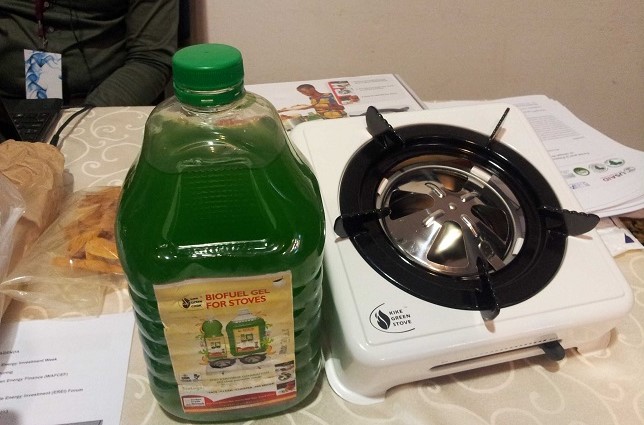At sunrise and sunset many Ghanaian households strike the match to burn charcoal or wood to heat water and prepare meals.

Behind the familiar crackle of flames lies a glowing crisis: household air pollution, deforestation, and the rising cost of traditional fuels.
As Ghana seeks cleaner, safer alternatives, bioethanol fuel is emerging as a game-changer in the clean cooking revolution.
A Renewable Flame
Bioethanol is a renewable, alcohol-based fuel produced through the fermentation of organic materials like sweet sorghum, cassava peels, maize stalks, sugarcane molasses, and food waste.
When burnt in clean cookstoves, it emits little to no smoke, offering a healthier and environmentally friendly cooking solution.
“Bioethanol offers a triple win – for the environment, public health, and energy access. It is one of the most scalable solutions to Ghana’s clean cooking challenge,” says Benjamin Boakye, the Executive Director of Africa Centre for Energy Policy in a recent study.
A Country in Need of Change
Seven out of 10 households in Ghana rely on solid fuels such as firewood and charcoal for daily cooking, according to data by the Ghana Statistical Service.
This practice is not only a leading cause of indoor air pollution—linked to respiratory illnesses, especially among women and children—but also a major driver of deforestation and greenhouse gas emissions, says Dr Emmanuel Y. Tenkorang, an Associate Professor at the Department of Environment, Governance and Sustainable Development, the University of Cape Coast.
“We found out that most homes use charcoal and the danger is that some homes do not have kitchens. In most cases, it is just the corridor that has been converted into a cooking area, using thick plastic to cover so often the fumes easily travel to the main house,” he adds.
According to the Ghana’s Ministry of Health, indoor air pollution is responsible for more than 18,000 premature deaths annually.
The country loses about 135,000 hectares of forest every year, much of it to fuelwood extraction.
“Switching to clean fuels like ethanol could drastically reduce these losses while improving lives,” notes Prof. Tenkorang.
A 2023 study by the Energy Commission estimated that Ghana has the potential to produce over 200 million litres of bioethanol annually from agro-waste alone – enough to supply clean fuel to nearly five million households if harnessed effectively.
The Untapped Potential of Bioethanol Production
A quiet transformation is taking root in Ghana’s clean energy sector as researchers and local partners work to establish sweet sorghum as a reliable raw material for bioethanol production.
After months of agronomic trials and feasibility assessments, the initiative has successfully identified suitable sweet sorghum varieties and is now preparing to construct a dedicated 81-litter per day bioethanol refinery to convert the crop’s sugary stalks into clean cooking fuel.
Led by the Ecolinks in collaboration with researchers and private sector actors, the project marks a significant step toward reducing dependence on wood fuels and promoting locally sourced renewable energy.
“The main focus for last season was to test the crop under different climatic conditions. We had a good outcome because even in the midst of the dry spell which affected cereals especially maize. The sweet sorghum did great,” Mr. Isaac Seidu Atayure, a project Officer at Ecolinks, says.
For this cropping season, the team is opening it up to farmers and testing additional varieties from Advanta international and ICRISAT.
A viable sweet sorghum variety that grows well in southern, middle and northern Ghana has been identified.
“The project will be operating on two models; one is to cultivate sweet sorghum on our production sites and the other is to engage Out-growers to grow sweet sorghum for us to buy. The initial phase is to develop 4000ha under both models to feed our refinery,” says Mr. Atayure..
“Sweet sorghum is an excellent feedstock for bioethanol production and unlike cassava it is not a stable food crop. Our model allows farmers to grow their food crops while ensuring a regular supply of feedstock for our refinery. We see sweet sorghum as a new revenue source for farmers to tap into,” he says.
Government welcomes initiatives that will explore the potential in bioethanol which include that of Eco links.
Mr. Seth Mahu, the Renewable Energy Director at the Ministry of Energy and Green Transition, tells the GNA that the government supports biofuel production and adequate provision has been made for its development in the country.
Aside from it being a substitute for clean cooking, he says the country has made provision for biofuel to be blended with conventional fuel to reduce the carbon level and make it viable
Mr. Mahu explains that a national biofuel policy is being developed, with stakeholder consultations already conducted in some regions to guide feedstock choice, production standards, land use, and ensure food security is protected.
Persons with deep knowledge in the sector like Mr. Benjamin Boakye, say the potential is huge but manufacturers and governments must heighten research on the most efficient ethanol-based cookstoves to replace the existing ones with design and operational flexibility challenges.
Mr. Johnson Penn, Chief Executive Officer of EcoLinks, is also suggesting to the government to provide incentives, including tax exemptions on bioethanol fuel and stoves, to make clean cooking solutions affordable and accessible for low-income households.
For now, the flame is small – but with the right support, it could light the way for millions of Ghanaians toward a healthier, greener tomorrow.
By Albert Oppong-Ansah
